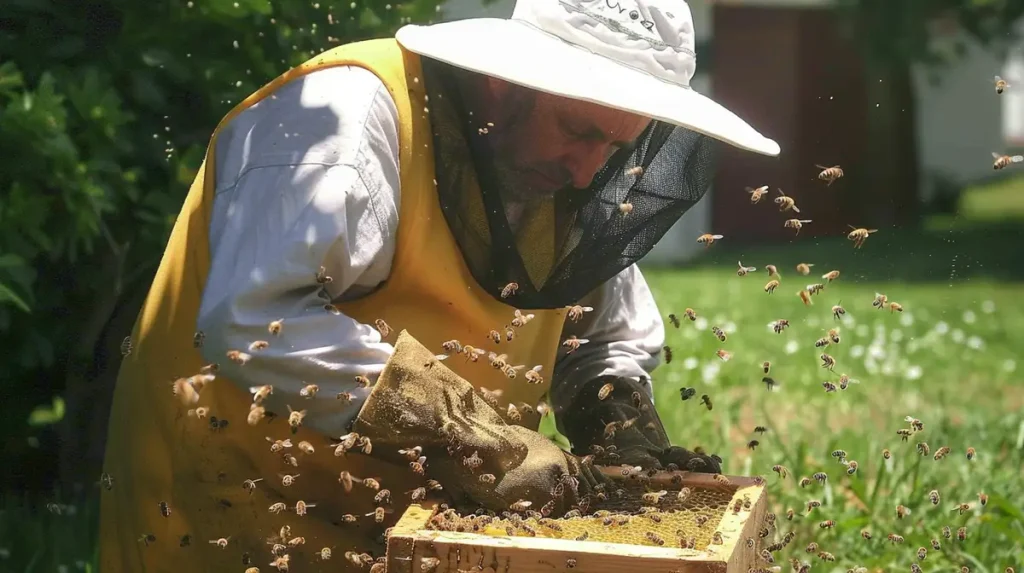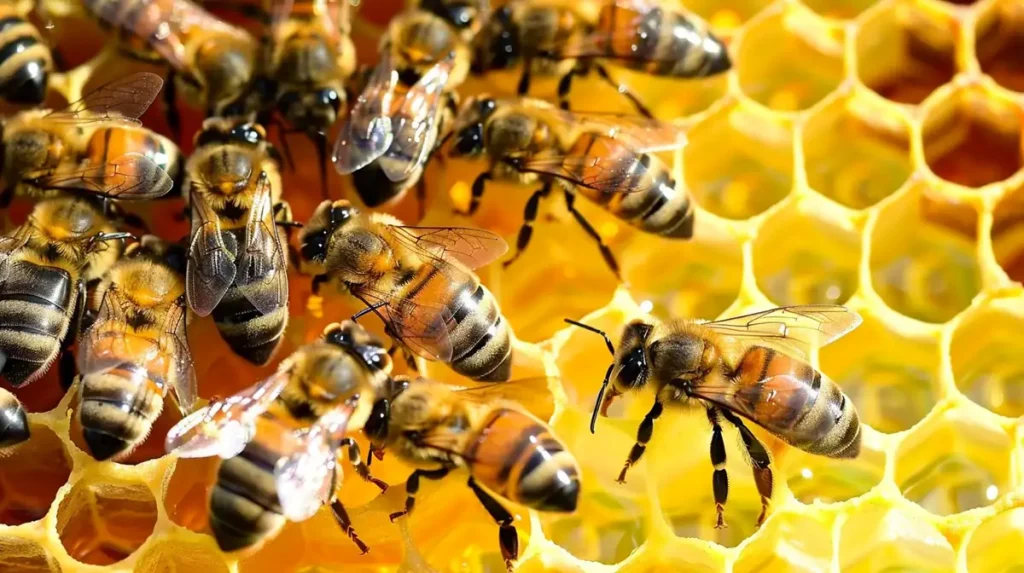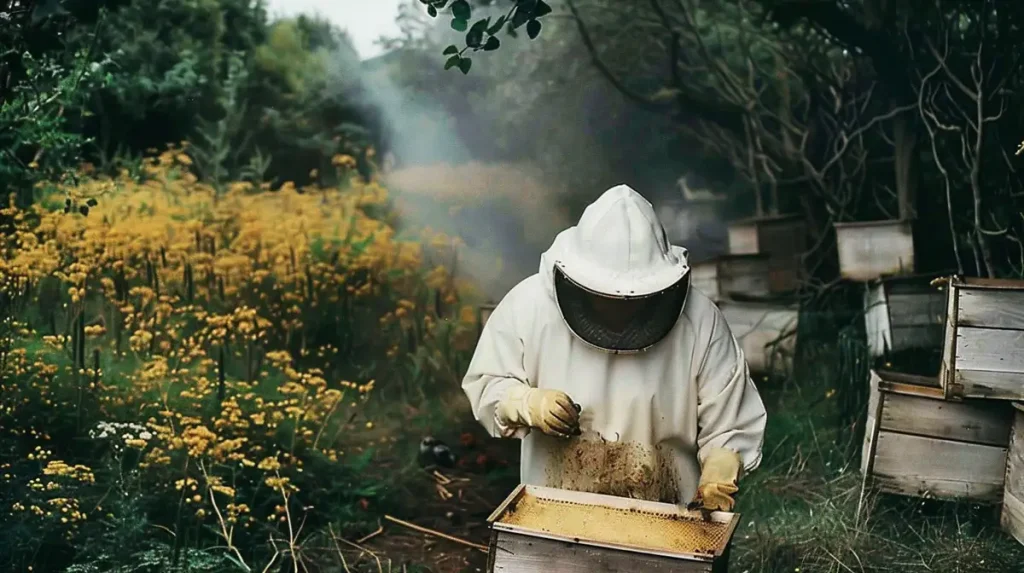Table of Contents
With many years of experience under my belt, the ‘unusual’ nature of what I do affords me plenty of opportunity to explain beekeeping to curious visitors. Over many years of discussing my hobby to others, one of the most common questions I hear is this: what is beekeeping like?
That is such an open-ended question that it is really hard for even the most experienced beekeeper to answer quickly and succinctly. If you have a couple of hours to spend with me, you might gain at least a basic understanding of what I do. But short of that, the only way to really understand what it’s like to keep bees is to either do it yourself or spend time helping someone who already does it.
All of that notwithstanding, I know you are curious about beekeeping. So I am going to try to answer the question for you. Describing what beekeeping is like comes down to five key words:
- Fascinating
- Challenging
- Frustrating
- Relaxing
- Rewarding
I discuss my reasoning for each in the below paragraphs.
1. Fascinating
Experienced beekeeper’s love to talk about their bees for hours on end. Why? Because they find them absolutely fascinating. Bees are insects subject to a very strict social order that truly takes years to fully understand. Veteran beekeepers can tell you all about it. But they can also tell you that it took them years to figure their bees out.
For example, did you know that honeybees only swarm when they are looking for a new place to build the hive? Despite what you may have seen in films, honeybees rarely swarm for the purposes of attacking an enemy. Wasps, hornets, and other variations of bees may do that, but honeybees are among the least aggressive of all bee species.
Here are a few other fascinating things that veteran beekeepers know:
- Hive entrances are a wealth of information. In the beekeeping world, one of the most important indicators of how a hive is doing is its entrance. You can learn a lot about the health and structure of a colony just by observing what goes on at this one focal point.
- Warm weather is harmful to bees. In climates with consistently cooler temperatures, honeybees can live and work for up to nine months. In hotter climates though, adult bees rarely live longer than six weeks. The heavier workload associated with warmer climates actually kills them.
- Different bees have different jobs. Unlike humans, bees cannot grow up to be anything they want to be. Different bees have different jobs based on brain chemistry. There are scouts, soldiers, and hive caretakers. Roles may change as a bee ages, but any changes will be due to altered brain chemistry.
These are just three of the many fascinating facts about honeybees. Veteran beekeepers will attest to the fact that they are always learning something new about their prized insects. If nothing else, beekeeping is a fascinating and educational experience.
2. Challenging
It is not uncommon for new beekeepers to go into it assuming there is not much involved. They assume that the natural order of bees takes care of things all on its own. Unfortunately, that is not true. Nature is such that beekeeping can be very challenging on many levels. It doesn’t help that changing environmental conditions the world over are making it harder for bees to survive – especially without the help of human keepers.
Veteran beekeepers will tell you that what they do is challenging on multiple fronts. Just getting started is challenging enough. You have to figure out the best location for your hives; you have to pay attention to that initial colony to make sure it doesn’t collapse before it has a chance to thrive; you have to keep your eyes open for diseases and hive pests.
Beekeeping can be challenging from a legal standpoint as well. It can also be legally frustrating, but more on that later. In terms of the challenges, you may have to get a beekeeping license depending on where you live. You cannot just assume that you are free to purchase a few starter hives and set them up anywhere you like.
Here are some other things that challenge beekeepers:
- Carter, Anthony (Author)
- English (Publication Language)
- 194 Pages - 02/28/2024 (Publication Date) - Independently published (Publisher)
- Beekeeping is time-consuming. You cannot just set up your hives and forget about them if you expect them to thrive. Even with just a few hives, you will be putting in at least several hours every week. Investing in beekeeping is an investment in time as well as anything else.
- Bee colonies are fragile. Bee colonies are subject to harm from all sorts of things ranging from disease to damaging pests. Even the weather can cause problems. Your average bee colony is a very delicate ecosystem that requires proper care and feeding.
- Neighbors can be problematic. You might expect that your neighbors would be the last thing to challenge you as a beekeeper, but often times they are the first. People have a natural fear of bees even though it is not warranted. Your neighbors may not respond well should you decide to set up hives close enough to be seen from their property line.

3. Frustrating
The third of the five key words is ‘frustrating’. I will start with the legal aspects since they are fresh in your mind. Beekeeping can be frustrating if the local regulations in your area make it difficult for you to do what you want to do. Bureaucracy is always frustrating, isn’t it? It is even more frustrating when local officials are breathing down your neck.
Beyond the legal implications, it is easy to get frustrated when your bees are not producing the volume of honey you were hoping for. This is normal. Bee colony production ebbs and flows just like milk production on a cattle ranch or grain production on a farm. You are going to have some good years and some bad ones too.
Another source of frustration is the dreaded collapsed hive. It happens more frequently than many people realize. As previously stated, bee colonies are delicate ecosystems. As a new beekeeper, you could invest heavily in setting up two or three new hives only to have them all collapse within the first year. It does happen.
You might also find yourself frustrated by a queen that isn’t as productive as she should be. An unproductive queen will eventually be replaced by a new queen, but there may be some time in between when you just have to live with the fact that you are not getting as many eggs as you had hoped.
These are just a few things that can be frustrating to beekeepers. There are more, but you get the point. Beekeeping offers a lot to love, but it is not all sunshine and roses.
4. Relaxing
Although this term doesn’t apply to everyone, a lot of beekeepers talk about how relaxing keeping bees is. They find the sound of bees buzzing around the hive rather soothing. They enjoy going out to inspect their hives and collect the honey. They find the whole experience helps them to shut out the world for a time and concentrate only on the bees.
It can also be quite relaxing to just sit and watch the colonies from a distance. As previously stated, bees follow a very strict social order in everything they do. You can observe that social order just by watching them fly to and from their hives. To some beekeepers, there is nothing more relaxing than a cold drink and a busy hive on a lazy Sunday afternoon. They can sit and watch their bees for hours.
Should you decide to take up beekeeping, I hope you will find it relaxing as well. After all, isn’t that the point of having hobbies? If a beekeeper constantly finds him/herself stressed out, frustrated, and anxious, his or her hobby isn’t providing very much relaxation. It is probably time to sell the hives and take up something else.

5. Rewarding
Fifth on my list is the word ‘rewarding’. This sentiment is nearly universal among veteran beekeepers. There is just something very rewarding about tending to successful bee colonies year after year. Every spring you get to care for them while the queen starts laying eggs and the workers set about gathering food. You have the pleasure of cleaning out the hives and tending to the bee’s heath.
The sense of accomplishment that comes with maintaining successful colonies is one of the greatest rewards in beekeeping. Let’s face it, beekeeping is not easy. A lot of people try it and fail. To succeed requires a lot of hard work, quite a bit of knowledge, some intuition, and even a little bit of dumb luck. Knowing that you succeeded provides a sense of accomplishment because you have done something that not everyone can do.
Of course, there are financial rewards as well. You may not make a huge profit in beekeeping, but well attended bees will produce a number of different products you can sell to friends, family, and complete strangers too. Most beekeepers sell at least the honey and beeswax. Others harvest and sell bee pollen, propolis, larvae, royal jelly, and even venom.
Your Experience Will Be Unique
I have done my best with this guide to describe some of the basics of what beekeeping is like. Obviously, mere words on a screen cannot do justice to the time-honored practice of keeping bees. But hopefully you have a better understanding of what this hobby is all about. Needless to say, embarking on beekeeping as a hobby or business venture will be simultaneously fascinating, challenging, frustrating, relaxing, and rewarding. It is also what the beekeeper makes it.
Should you decide to take up beekeeping yourself, also know that your experience will be unique to some degree. Remember that you are dealing with living organisms. Every bee in your numerous colonies is a unique insect with its own personality. Collectively, your bees will also have a personality that may differ from one hive to the next. These different personalities are what will make your experience unique.
Where you live and the conditions you and your bees are exposed to will also affect your experience. What is normal for you may be completely abnormal for someone a few hundred miles away. I tell you this in hopes of helping you avoid the trap of thinking your beekeeping venture has been a failure because it doesn’t look exactly like another beekeeper’s. Expect your experience to be somewhat unique. Embrace it, because it’s good.
Looking to up your beekeeping game? Check out our latest product recommendations so you can take things to the next level!
Introducing The Top 12 Best Beekeeping Veils For 2024
Introducing The Top 20 Best Beekeeping Gloves For 2024
Introducing The Absolute Best Beekeeping Suits For 2024
The 15 Top Beekeeping Books for 2024
The Top 11 Honey Extractors for 2024
The Top 12 Mason Bee Houses for 2024
Beekeeping Disclaimer:
Beekeeping, like any agricultural activity, involves inherent risks. It is important to understand these risks and take appropriate measures to mitigate them.
Potential risks associated with beekeeping include:
- Bee stings: Honey bees are generally not aggressive but can become defensive if they feel threatened or their hive is disturbed. Bee stings can cause allergic reactions or even anaphylaxis in some individuals, which can be life-threatening. It is important to wear protective clothing and follow best practices when handling bees to minimize the risk of stings.
- Diseases and pests: Bees can be vulnerable to various diseases and pests, including mites, viruses, and bacterial infections. These can have significant impacts on bee colonies, leading to reduced honey production or even colony collapse. It is important to monitor hives regularly and take appropriate measures to prevent and treat diseases and pests.
- Weather conditions: Extreme weather conditions, such as drought or cold temperatures, can affect the health and productivity of bee colonies. It is important to ensure that hives are appropriately sheltered and provided with adequate food and water.
- Environmental hazards: Bees can be affected by environmental hazards such as pesticide exposure, pollution, and habitat loss. It is important to be aware of these hazards and take appropriate measures to protect bee colonies and promote healthy environments for bees.
- Legal requirements: Beekeeping may be subject to local, state, or national regulations, such as registration or inspection requirements. It is important to be aware of these requirements and comply with them.
While beekeeping can be a rewarding and enjoyable activity, it is important to be aware of the potential risks and take appropriate measures to mitigate them. By following best practices and staying informed about the latest developments in beekeeping, beekeepers can help ensure the health and productivity of their hives and contribute to the well-being of bee populations worldwide.
Last update on 2024-04-25 / Affiliate links / Images from Amazon Product Advertising API


